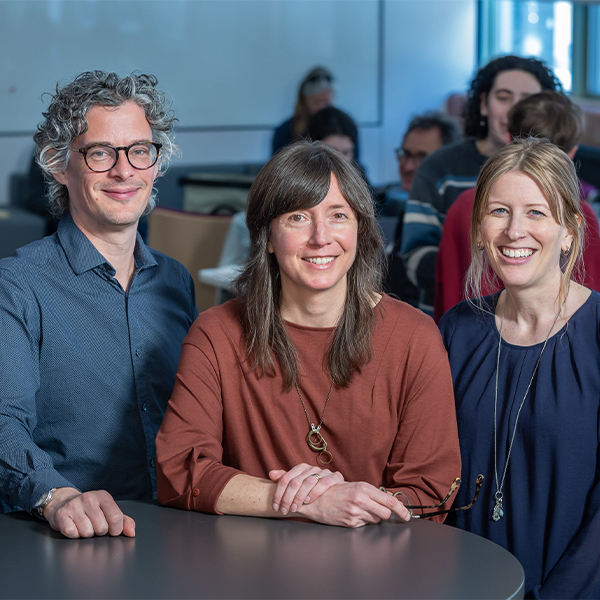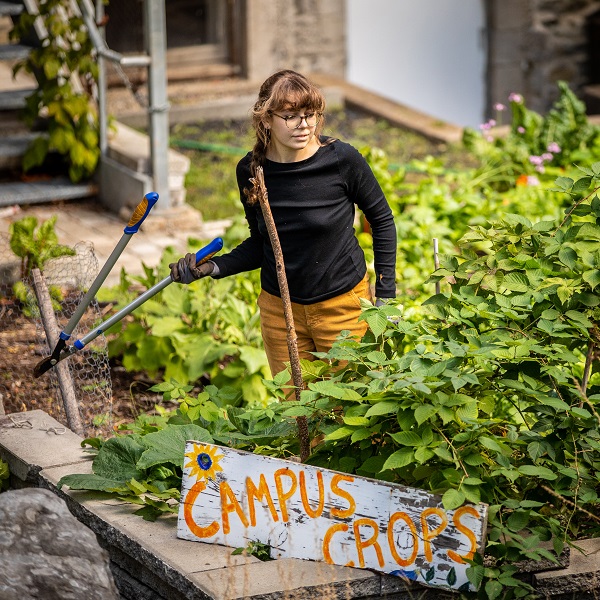Keesha Ness’s family certainly knows farming – they’ve been doing it for nearly 100 years and plan to celebrate when they reach that milestone next summer.
Ness is passionate about farming, loves her cows, and plans to follow the family’s tradition.
“I’m definitely hoping to help out with the management side,” says Ness of her family’s Ayrshire dairy farm in Howick, Quebec.
“I really love the management side of it.”
Ness is in her second year of Farm Management and Technology (FMT), the only CEGEP-level (collegial) program offered by McGill.
About 110 students are enrolled in the three-year diploma program at Macdonald Campus. The traditional clientele is students from farms in rural Quebec. “The English community, most certainly, but also the French community in proximity to Ste-Anne-de-Bellevue,” says Peter Enright, BSc(AgrEng)’86, MSc’89, the program’s director at McGill’s Faculty of Agricultural and Environmental Sciences.
Dairy – the biggest agricultural sector in Quebec – remains the students’ main area of interest.
The academic and practical program prepares students to operate and manage an agricultural business and for careers in horticulture and agriculture.
“It’s a massively complex job,” says Enright, of modern-day farming.
“Farms are so big that you’ll probably farm with a partner, be it a spouse or sibling or cousin or aunt and uncle.”
He rhymes off a list of skills and attributes needed, including being able to handle the financial side of the work and hire and supervise people. “You maybe have to learn how to offset risks by buying futures contracts,” he adds.
The first year of the program revolves around the basic sciences that underpin agriculture, with instruction in topics such as soil tillage and fertility, plant science, animal physiology and anatomy.
“We try and deliver it with a management focus,” explains Enright, who is also a faculty lecturer. “Let’s not just say here’s how people till the soil; let’s say here’s what they’re trying to achieve, here’s the context they do it in.”
Students take financial courses, including farm accounting, as well as marketing.
“I think the FMT program has a very strong reputation for turning out people who are competent farm managers… They know how to do the financial analysis. They understand financing. The bankers tell us, ‘I like working with your graduates because they know what they’re talking about.’” Enright says.
In their second year, students can choose to focus more on animals or crops – “and crops include vegetables and fruits as well as field crops,” says Caroline Begg, BSc(Agr)’79, PhD’95, a faculty lecturer and director of the stage (internships) component of the FMT program.
Students do four internships: two week-long stages in their first year, and two 13-week summer internships.
“There’s such a high demand in the agricultural industry for labour that usually they can pick and choose where they want to work,” says Begg.
About 10 per cent of students do their internships on farms in Western Canada.
“You can work close to your home farm, but then you never really get away. You’re not really forced to kind of see things really differently. So I do encourage them to go out west and sort of experience a completely different type of agriculture. It’s bigger fields, it’s different systems,” she says.
Students get a chance to do hands-on activities during the three-year program. For example, they take apart a small engine, change some parts and reassemble it. It will be an essential skill on their farm in terms of basic maintenance, Enright says. “What we’re developing as a skill is basic mechanical skills.”
In their final year, students work on a farm project, analyzing and evaluating a farm based on performance indicators, looking for strengths and weaknesses, and coming up with a management plan.
The vast majority of students in the program come from farms and it’s probably the first time they’ve been in a class with so many other individuals with similar backgrounds and aspirations, Begg notes.
“They have people that they can talk to that understand where they’re coming from. So we emphasize a lot that this is the start of their networking – the friends that they make here can be friends for their lives. And they can serve as a network in the future when they go back to their farms.”
Among the second-year students, there are more women than men “and that is remarkable,” says Enright. “That, I think, is the first time we’ve seen that.”
He has also noticed more students coming into the program who are refocussing their careers in this area.
There have always been non-farm students in the program, Enright says.
Like Andrew Harrel, FMT’17, who had an urban upbringing.
“There weren’t a lot of us, but I feel like the accommodation was there. There was obviously a bit of a learning curve at first. Quite frankly, I didn’t know that chocolate milk didn’t come from a brown cow when I started,” Harrel says, laughing at the memory.
He’s now a vegetable farmer in Papineauville, Quebec. His Fairweather Farm/Ferme du Beau Temps isn’t certified organic yet, but he’s working toward that goal. Harrel loves his line of work.
“I love it. It’s exactly for me,” he says. There’s the physical aspect of the work and you’re outside in nature. “And then it’s very fulfilling to actually feed people because they’re very appreciative.”
Harrel had an “excellent” experience in the FMT program.
“From A-Z, they covered pretty much everything I could have wanted and then things I didn’t even realize were implicated in farming at the time when I had started, like accounting and different sides of mechanics, and even like [the] electrical basis, plumbing. It’s really quite vast. And it’s impressive that they touch on all the things that are relevant to all kinds of farmers.”


